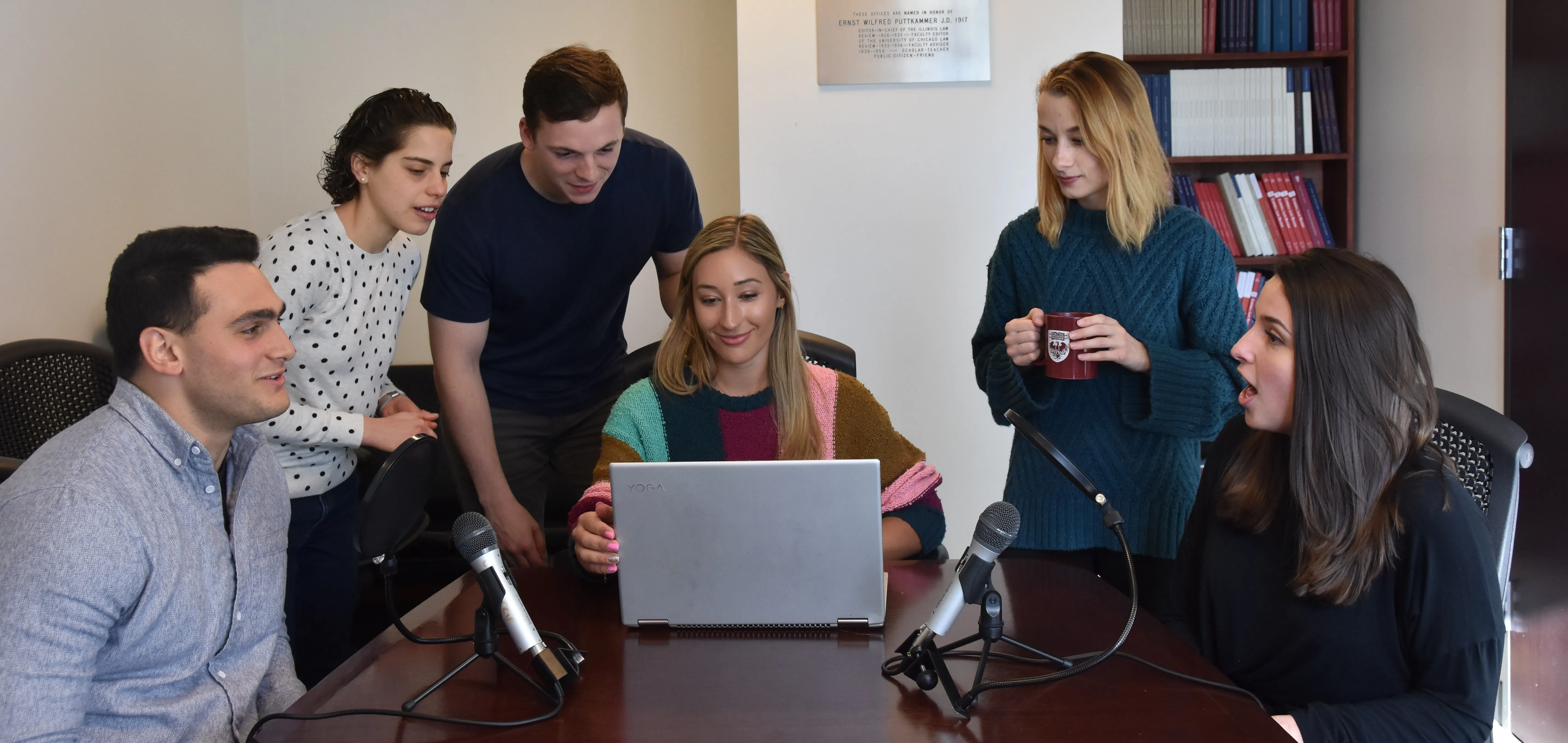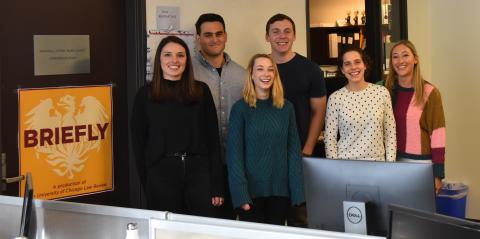Podcasting the Law

Once or twice a month, members of the University of Chicago Law Review’s online team gather in a basement conference room in the back of the Law School’s journals office to discuss a pressing legal issue with top legal scholars, some of whom join remotely and some of whom appear in person. Later, they edit the conversation for the latest episode of their podcast, Briefly, and release it to the world.
Their project represents the newest layer to the storied work of the nearly 87-year-old Law Review—one that exists alongside the traditional publication and aims to make legal scholarship accessible to a broader audience. It’s an effort, too, that requires a particular blend of skills: technical know-how and editing savvy combined with an appreciation for the careful study and on-your-feet thinking needed to execute a nuanced and compelling interview.
“The podcast is a way for serious ideas to reach a broader audience—it’s the heir to the intellectual radio show,” said Professor William Baude, who has appeared as a Briefly guest twice. “The editors have been excellent at distilling important ideas into an engaging conversation. I wish every article of mine could become a podcast.”
Now in its third season—Briefly debuted in October 2017 with an episode on Colin Kaepernick’s legal claim against the NFL—the podcast has covered a wide range of topics, including #MeToo, the opioid crisis, the Chicago School of Antitrust, and competing views on when courts should overturn precedent. It draws several hundred listeners per episode—and the number is growing.
Earlier this month, we talked with Executive Online Editor Ianni Drivas, ’20, who leads a production team that includes online editors Merav Bennett, Eden M. Bernstein, Alexis Knutsen, Chase H. Robinett, David Brandon Smith, and Emily Snoddon, all ’20. Drivas talked with us about some of Briefly’s most popular episodes, the challenges and surprises of podcast production, and why the medium has become the latest frontier for student journals.
Q: The Law Review has released 28 episodes so far, nine of them under your watch. What makes for a good episode?
A: I think several factors contribute. First, we try to cover timely legal issues that will be engaging for a broad audience. To that end, we tend to avoid delving into specific doctrinal questions and instead focus on higher-level trends in the law and why they’re important. Also, we’ve found a relaxed, informal conversation between the host and guest makes for compelling listening and is crucial for producing a good episode.
Q: We know you probably don’t want to pick favorites, but we’re going to ask anyway: were there episodes that were particularly fun to produce or resonated particularly well with listeners?
A: Each episode has been fun to produce but a few of them have been especially memorable. Our “Roberts Court” episode with Adam Liptak of the New York Times and Lee Epstein of Washington University St. Louis comes to mind, both because it was the first episode produced by the current Law Review board and because the guests offered fascinating insights regarding trends on the Supreme Court. Our episode, “Who Do Corporations Serve?,” which discussed arguments for and against shareholder primacy, was particularly interesting to research and produce, as it covered an issue in corporate law that’s hotly debated at the moment. And listeners also seem to have found our episode on whether law schools are bad for democracy thought-provoking.
Q: I’d imagine so! How did they respond?
A: The episode featured [Yale Law Professor] Samuel Moyn, who wrote an article arguing law schools in the US were harmful for democracy, and [National Affairs Editor] Yuval Levin, who responded to that claim. I think a lot of listeners found it interesting to hear two sides of that debate and to consider the role law schools play in American political life—that is whether law schools help prospective lawyers fight for justice or whether they entrench existing hierarchies.
Q: You’ve done a good job of making many of the episodes accessible to general audiences. For instance, you started a November episode on stare decisis—the legal principle that obligates judges to respect precedent—by having Professor Will Baude explain precedent. Who are you hoping to reach?
A: Listeners who are interested in the law and who want to learn about it through a medium that’s less dense than typical legal scholarship. This includes lawyers, law students, and legal academics but also anyone who wants to understand major issues in the law without digging into a treatise or law review article on the subject.
Q. The University of Chicago Law Review has been around since 1933—it’s an institution. What does it mean to be part of this new phase in its history, and what drew you to the opportunity?
A: I think the two previous boards that started Briefly recognized that, for the Law Review to maximize its influence, we need to appeal to a broader audience than our print articles are directed towards. Working on Briefly appealed to me because I think legal podcasts offer law reviews an opportunity to attract new followers and expand their impact beyond traditional scholarship. And, through Briefly, our Law Review has been a leader in that regard.
Q: Tell us a bit about your process behind the scenes. What goes into creating each episode?
A: Before each academic quarter, the members of the online team research legal issues that we find interesting. From that research, we pick a topic for each upcoming episode and then we reach out to experts who we think will offer interesting commentary and provide a balance of views on the subject. Next, we thoroughly research the legal issues relevant to the topic and prepare an outline of what we’d like to discuss with each guest. One or two online editors then conduct interviews with the guests and edit the interviews to select the most interesting content and to ensure the episode flows smoothly. Finally, we publish the episodes on our UCLR Online publication, as well as on several podcast platforms, including Soundcloud, Apple Podcasts, Spotify, and Stitcher.
Q: What are the biggest challenges?
A: One of the biggest challenges is striking a balance between keeping our interviews conversational and ensuring that they cover all of the legal questions we hope to answer. We never want our interviews to feel staged or inorganic but we also try to make sure they stay focused and narrow in scope.
Q: What has been the biggest surprise since you began working on Briefly?
A: How happy prospective guests have been to join us for interviews and how generous they are with their time. We’ve been grateful that law professors and practitioners have typically been excited to come on the podcast.
Q: You’ve played with different guest formats. Sometimes you feature a single expert—as you did when you spoke with attorney Michael Scodro for an episode on the Supreme Court’s decision in Gamble v. the US—and sometimes you offer a debate, as you did when Law School Professor Eric Posner and Booth Professor Luigi Zingales offered opposing viewpoints on whether corporations are responsible to more than just their shareholders. How do the dynamics change with the format?
A: There are tradeoffs involved with interviewing one or multiple guests. We’ve found that interviewing one guest, as in the episode with Michael Scodro, allows us to thoroughly explore the guest’s views and experiences. Also, from a logistical standpoint, a one-on-one interview is often easier to conduct and edit. But we’ve generally featured multiple guests on our episodes because we’ve found that hearing a diversity of views on a legal question makes for a more interesting discussion. For example, in our recent “Who Do Corporations Serve?” and “Universal Basic Income” episodes, it was great to hear scholars with different perspectives challenge each other’s arguments and recreate the debates that are currently playing out in the legal community.
Q: What have you learned working on the podcast?
A: Among other things, I’ve learned how important preparation is for conducting a successful podcast interview. Thoroughly researching the legal topic and the guest’s views on it has been essential, both because it allows us to craft interesting questions beforehand and because familiarity with the subject lets us improvise and take interviews in unexpected (but fruitful) directions.
Q: Is there anything we haven’t talked about that you’d like people to know about Briefly?
A: We hope listeners have been enjoying Briefly and finding it informative. We look forward to producing the last five episodes of Season 3 and hope everyone tunes in when the next board produces Season 4!
The Briefly podcast is available on UCLR Online, as well as through most podcast apps.
